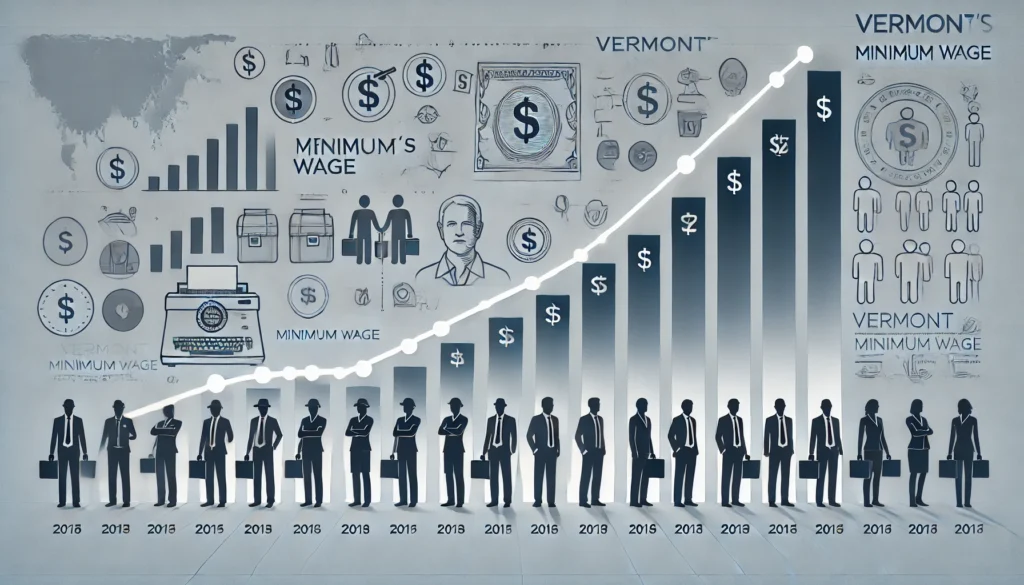2024 Vermont Minimum Wage Update: Everything You Must Know

The minimum wage in Vermont is a crucial aspect of the state’s labor laws, affecting both employees and employers. Understanding these regulations is essential for ensuring compliance and protecting workers’ rights. This article delves into the intricacies of Vermont’s minimum wage, how it compares to federal standards, and what changes might be on the horizon. Whether you’re an employer, an employee, or just interested in labor laws, this guide will provide you with the necessary insights to navigate the wage landscape in Vermont.
Table of Contents
- Current Minimum Wage in Vermont
- How Vermont’s Minimum Wage Compares Nationally
- Vermont Labor Laws and Wage Regulations
- Employee Rights Under Vermont’s Wage Laws
- Minimum Wage Increases in Vermont: What to Expect
- How Deskcove Can Help Businesses Stay Compliant
- FAQ
Current Minimum Wage in Vermont
Overview of the Minimum Wage
As of 2024, the minimum wage in Vermont stands at $13.18 per hour, one of the highest in the United States. This rate reflects Vermont’s commitment to providing a livable wage for all workers. The minimum wage is scheduled to increase annually, tied to the Consumer Price Index (CPI), ensuring that wages keep pace with inflation.
Impact on Workers and Employers
The higher minimum wage benefits workers by increasing their earning potential, especially in a state where the cost of living is relatively high. However, employers, particularly small businesses, may face challenges in adjusting to these increases. Balancing fair compensation with operational costs is a delicate act for many Vermont businesses.
Exceptions and Special Cases
Some workers in Vermont are exempt from the standard minimum wage. For instance, tipped employees have a lower base rate of $6.59 per hour, provided that their tips bring them up to the standard minimum wage. Additionally, certain sectors like agriculture and seasonal work may have different wage requirements.

How Vermont’s Minimum Wage Compares Nationally
Comparison with Neighboring States
Vermont’s minimum wage is significantly higher than that of many neighboring states. For example, New Hampshire’s minimum wage is set at the federal level of $7.25 per hour, less than half of Vermont’s rate. This discrepancy often leads to cross-border employment opportunities, with workers seeking higher wages in Vermont.
Federal vs. State Minimum Wage
While the federal minimum wage has remained stagnant at $7.25 per hour since 2009, Vermont’s proactive approach to wage increases highlights the state’s commitment to worker welfare. Vermont’s minimum wage is almost double the federal standard, ensuring that workers earn a livable wage despite the lack of federal action.
Economic Implications
Vermont’s higher minimum wage impacts the local economy in several ways. On the one hand, it increases consumer spending as workers have more disposable income. On the other hand, it can strain businesses with tight profit margins, potentially leading to higher prices or reduced hiring.
Vermont Labor Laws and Wage Regulations
Key Wage Laws in Vermont
Vermont’s wage laws are designed to protect both workers and employers. These laws cover not only minimum wage but also overtime pay, meal breaks, and other employment conditions. The Vermont Department of Labor plays a crucial role in enforcing these regulations, ensuring that all parties comply with state standards.
Penalties for Non-Compliance
Employers who fail to comply with Vermont’s wage laws face significant penalties. These can include fines, back pay for employees, and even legal action. It’s crucial for businesses to stay informed about wage regulations to avoid costly mistakes.
Recent Changes and Updates
Vermont continually updates its labor laws to reflect changes in the economy and workforce needs. Recent updates include adjustments to wage rates and new regulations on worker classification, particularly concerning independent contractors. Staying current with these changes is essential for both employers and employees.
Employee Rights Under Vermont’s Wage Laws
Understanding Employee Protections
Vermont’s labor laws provide robust protections for employees, ensuring they receive fair compensation for their work. These protections include the right to earn at least the minimum wage, receive overtime pay for hours worked beyond 40 in a week, and have safe working conditions.
How to Address Wage Discrepancies
Employees who believe they are not being paid fairly can file a complaint with the Vermont Department of Labor. The department investigates wage claims and can order employers to pay back wages if violations are found. Employees also have the right to seek legal representation if necessary.
Support Resources for Employees
Vermont offers several resources for employees to understand their rights and seek assistance. These include online tools provided by the Department of Labor, legal aid services, and worker advocacy groups that offer support and guidance.
Minimum Wage Increases in Vermont: What to Expect
Scheduled Wage Increases
Vermont’s minimum wage is set to increase annually, with adjustments based on the CPI. This system ensures that wages keep pace with inflation, providing workers with a stable income that reflects the rising cost of living. The next scheduled increase is expected to raise the minimum wage to approximately $13.50 per hour.
Long-Term Projections
Long-term projections suggest that Vermont’s minimum wage could reach $15 per hour within the next few years. This projection aligns with the broader movement across the United States advocating for a $15 minimum wage as a standard. However, this increase will depend on economic conditions and legislative decisions.
Impact on the Vermont Economy
Continual increases in the minimum wage will have a mixed impact on the Vermont economy. While higher wages improve living standards for workers, they also pose challenges for small businesses and could influence pricing and employment levels. Monitoring these impacts will be crucial for policymakers.
How Deskcove Can Help Businesses Stay Compliant
Tools for Wage Compliance
Deskcove offers a suite of tools designed to help businesses manage wage compliance effectively. From automated payroll systems to compliance tracking, Deskcove ensures that businesses adhere to Vermont’s labor laws, avoiding costly penalties and ensuring that employees are paid fairly.
Streamlining Payroll Management
With Deskcove’s payroll management tools, businesses can easily calculate wages, including overtime and other pay adjustments. These tools help employers stay organized and ensure that all payments are accurate and timely, reducing the risk of non-compliance with Vermont’s wage regulations.
Support for Small Businesses
Deskcove understands the challenges small businesses face in maintaining wage compliance. Our platform provides resources and support specifically tailored to small businesses, helping them navigate complex regulations without overwhelming their operations.
FAQ
What is the current minimum wage in Vermont?
As of 2024, the minimum wage in Vermont is $13.18 per hour. This rate is adjusted annually based on the Consumer Price Index.
How does Vermont’s minimum wage compare to the federal minimum wage?
Vermont’s minimum wage is significantly higher than the federal minimum wage of $7.25 per hour. This difference highlights Vermont’s commitment to providing a livable wage for its workers.
Are there any exceptions to Vermont’s minimum wage laws?
Yes, certain workers, such as tipped employees and agricultural workers, may be subject to different wage rates. It’s important to check Vermont’s labor laws for specific exemptions.
Understanding the minimum wage in Vermont is essential for both employers and employees to ensure compliance with state labor laws and to secure fair wages. For businesses seeking assistance with wage management, Deskcove offers reliable tools and support to help navigate these complex regulations.
